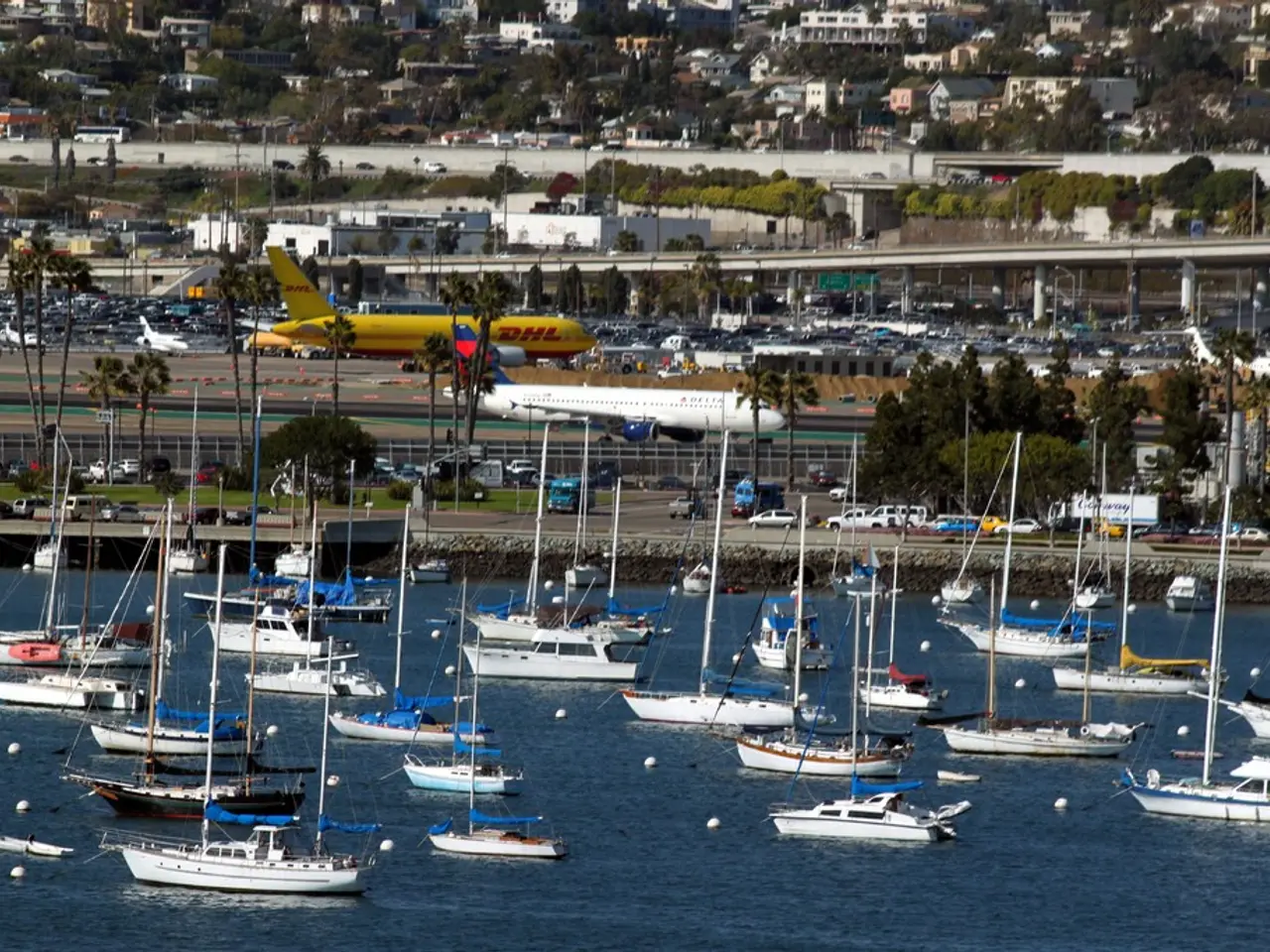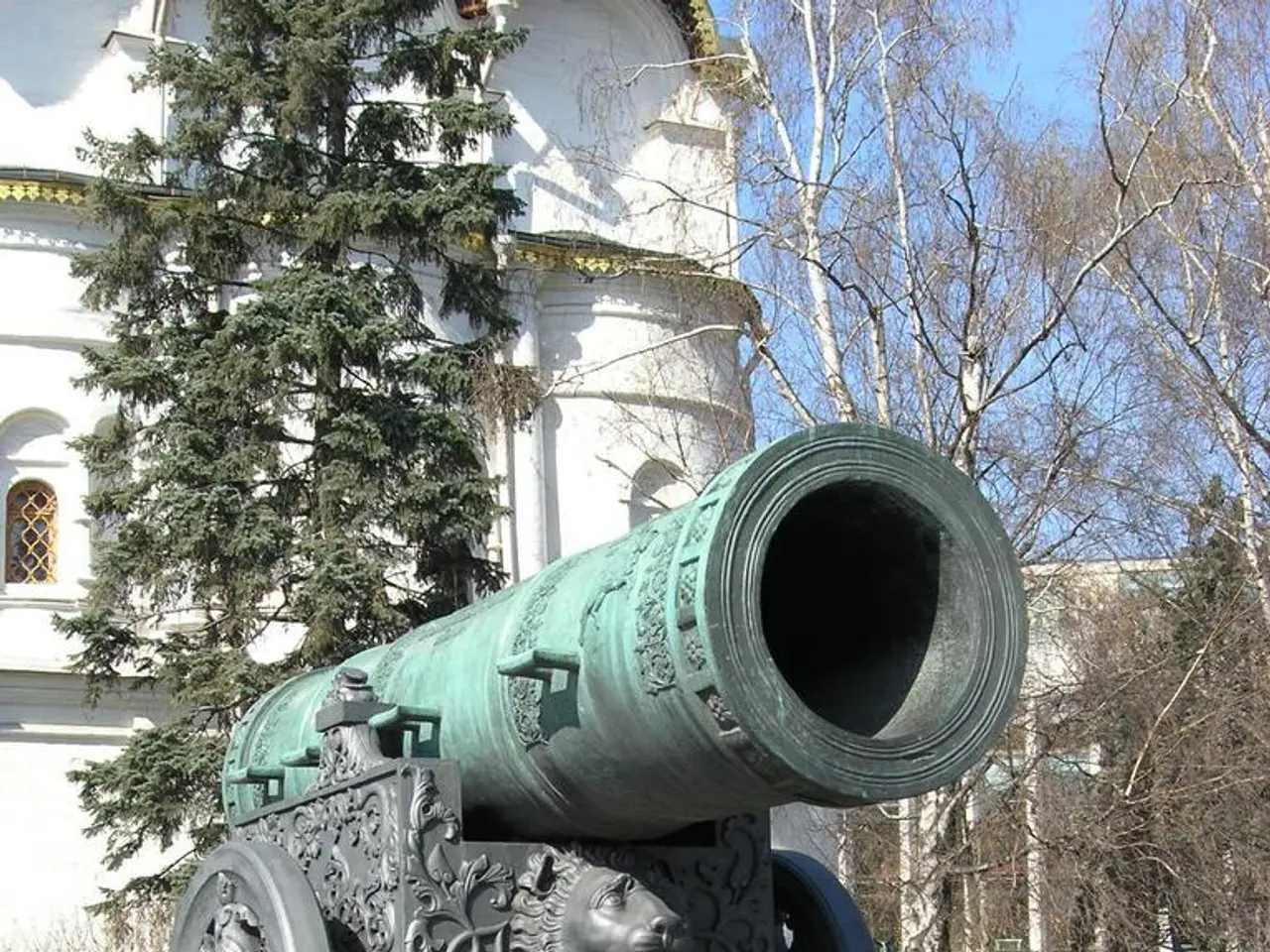Liquefied Natural Gas Export Ambitions Continue Amid Challenges for Russia
Russia intensifies push to boost LNG exports following U.S. sanctions, according to Bloomberg's report
Russia is attempting to expand its exports of Liquefied Natural Gas (LNG) following disruptions at its flagship Arctic LNG 2 plant, as reported by Bloomberg on June 28. The Arctic LNG 2 project, led by Russian company Novatek, has been targeted by ongoing U.S. sanctions, posing significant difficulties for the production and export of LNG.
The Arctic LNG 2 project, envisioned as Russia's largest LNG plant, was designed to produce almost 20 million metric tons of LNG per year. However, the U.S. State Department imposed sanctions on the project in 2024, affecting its operations.
Recent satellite images and ship-tracking data analyzed by Bloomberg indicate that a LNG vessel has docked at the Arctic LNG 2 facility for the first time since October 2024. At least 13 vessels, dubbed Russia's "shadow fleet," have been assembled, potentially to serve the Arctic LNG 2 plant.
The 13 vessels include four ice-class vessels, three traditional LNG vessels, and several others under repair or idling. Finding buyers for the LNG produced may pose a challenge due to concerns about sanctions violations.
In the face of declining pipeline gas shipments to Europe because of the full-scale invasion of Ukraine, Russia's "shadow fleet" has continued to grow. This group of aging oil tankers is used to circumvent global sanctions, and Moscow now has more vessels at its disposal than it did last year, according to Malte Humpert, founder of the Arctic Institute think tank.
If Russia can find buyers for its LNG, it should be sufficient to meet the demands, said Humpert in an interview with Bloomberg. However, the search for buyers in China and India has yet to result in any sales, as reported by traders familiar with the matter.
Arctic LNG 2 successfully resumed production from its gas fields after halting liquefaction in November 2024 due to Western sanctions. The project had cut production to almost zero at that time. The U.S. imposed sanctions on two vessels and two entities connected to Arctic LNG 2 in September 2024, which likely forced Novatek to scale back its operations at the facility.
In attempting to overcome the challenges posed by sanctions and logistical difficulties, Russia is turning to domestic capabilities and cooperation with "friendly countries." Novatek is building new Arc7 ice-class LNG tankers at the Zvezda Shipyard, designed to navigate thick Arctic ice, to support export logistics. The first tanker, the Alexey Kosygin, started sea trials in late 2024, and it is expected to join the fleet in the second half of 2025.
Despite these efforts, continued U.S. and EU sanctions place restrictions on Russia's ability to attract foreign investment, procure specialized equipment, and access international financial markets. These limitations delay full project implementation, while the reliance on ice-class tankers to tackle the logistical challenges caused by the sanctions also creates bottlenecks and delays.
International buyers have shown reluctance to source LNG from Arctic LNG 2 amid sanctions and geopolitical risks, resulting in a lack of commercial appetite and stored LNG cargoes rather than exports abroad. Supply chain and construction delays brought about by the withdrawal of key international partners, such as France’s TotalEnergies and Japan’s Mitsui & Co., deal further blows to the project's progress.
In summary, the Arctic LNG 2 project operates with partial functioning in the midst of international sanctions and logistical challenges. The sanctions have directly impacted vessel availability, export routes, and caused temporary shutdowns and storage bottlenecks. Despite efforts to mitigate these obstacles, such as ramping up domestic tanker construction and shifting export logistics, Russia faces significant headwinds in reaching its full production capacity of 19.8 million tonnes per year by 2030, due to sanctions, logistical issues, and geopolitical uncertainties.
[1] S. Chowdhury, "Arctic LNG 2 project," Revised: January 29, 2025. https://arcticinstitute.org/2024/08/05/arctic-lng-2-project/
[2] S. Hollis, "Arctic offshore oil and gas – Russia's new battleground," Oxford Energy Insight, October 12, 2022. https://www.oxfordenergyinsight.com/explainer/arctic-offshore-oil-and-gas-%E2%80%93-russias-new-battleground/
[3] R. I. Waller, "Russia Arctic LNG Project Demonstrates Resilience," Natural Gas Intelligence, May 17, 2025. https://www.naturalgasintel.com/desktop/longform/russia-arctic-lng-project-demonstrates-resilience
[4] P. Nuutinen, "Russia gives green light to 'monster' Arctic LNG plant," Reuters, February 6, 2024. https://www.reuters.com/business/energy/russia-gives-green-light-monster-arctic-lng-plant-2024-02-06/
- The ongoing U.S. sanctions against Russia's Arctic LNG 2 project have significantly impacted the finance, policy, and politics of the oil-and-gas industry.
- The energy sector, particularly the oil-and-gas industry, is closely monitoring the situation in regions such as the Arctic, where war-and-conflicts and geopolitical tensions can disrupt production and exports.
- Crime-and-justice implications are also a concern, as nations debate the legality of sanctions and whether they constitute an illegal blockade of trade.
- General news outlets, including Bloomberg, have been reporting on the challenges faced by the Arctic LNG 2 project, underscoring the importance of following news developments in the energy, finance, and politics sectors.




